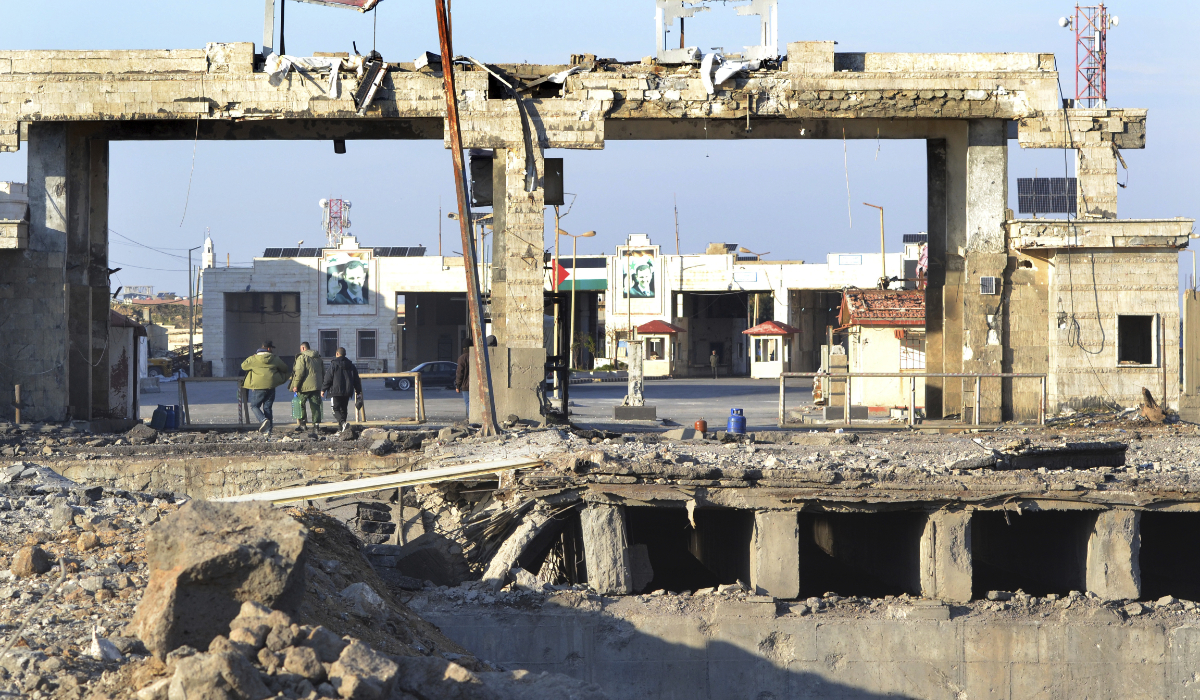BEIRUT: The Lebanese Army will continue to cooperate with UNIFIL in southern Lebanon, government figures said on Friday in a meeting with visiting Italian officials.
Caretaker Defense Minister Maurice Slim highlighted Lebanon’s full adherence to UN Resolution 1701 during talks with his Italian counterpart, Guido Crosetto.
He condemned recent Israeli actions on Lebanese territory as a “blatant violation of the ceasefire terms.”

People cross through the destroyed crossing border point between Lebanon and Syria which hit by an Israeli airstrike, in Arida, north Lebanon, Friday, Dec. 6, 2024. (AP)
The meeting reviewed “military cooperation between Lebanon and Italy, along with the important role of the UNIFIL Italian contingent,” according to Slim’s office.
Crosetto briefed Slim on Italian efforts to reach a ceasefire agreement in Lebanon and “establish stability, particularly in the south, through existing cooperation between UNIFIL and the Lebanese Army.”
Italy “will continue to support the Lebanese Army by organizing further conferences to enhance its capabilities, especially during this critical stage,” said Crosetto.
BACKGROUND
Israel stepped up its campaign in south Lebanon in late September after nearly a year of cross-border exchanges begun by Hezbollah in support of Hamas following the Oct. 7, 2023 attack on southern Israel.
Slim said the Lebanese Army “will cooperate as much as possible with UNIFIL, particularly at this critical juncture, as the army plays a central role in maintaining security and stability in the south.”
Crosetto also met Lebanese Army Commander Gen. Joseph Aoun.
Italian Army Chief Gen. Luciano Portolano was also present.
They discussed “ways to strengthen cooperation between the two countries’ armies.”
The diplomatic efforts continued as Lebanon said it closed all land border crossings with Syria on Friday except for the central route linking Beirut to the Syrian capital, Damascus.
The General Security Directorate said the Masnaa crossing will remain open for entries and exits.
The decision follows a series of Israeli airstrikes that targeted Lebanese-Syrian border crossings on Friday morning.
Closing all but one border crossing will ensure the safety of civilians, the directorate said.
Public Works Ali Hamieh Minister told Reuters that the Israeli strikes targeted the Syrian side of the Aridah border crossing in the north and the Jousieh crossing on the eastern side.
According to Lebanon’s National News Agency, the Lebanese Army set up checkpoints and dispatched patrols amid strict measures and procedures.
The agency said that the army was intensively deployed along the border area in Akkar and other villages and towns adjacent to Syrian territory.
In parallel to the Lebanese security measures, rapid military developments were taking place in Syria.
Armed opposition factions were advancing toward the Homs governorate, close to the Lebanese border.
Fears of infiltration attempts into Lebanese territory and illegal immigration also mounted in Lebanon.
Lebanese Army Command said on Friday that “two army units, backed by two military intelligence units, arrested 36 Syrians, including 24 people detained at the Deir Ammar checkpoint in the north, for residing in Lebanon without legal documentation, as well as 12 others in Beit Al-Tashm, Hermel, for clandestinely entering the country.”
Israeli Army spokesperson Avichay Adraee claimed that Israel targeted Syrian routes used for transporting combat equipment, as well as infrastructure established near the border with Lebanon.
The ceasefire between Hezbollah and Israel was signed more than a week ago but Israeli violations by air and land continue.
On Thursday night, Israeli drones and jets flew at low altitudes across Lebanese airspace, from Shebaa in the far south to Hermel in the far northeast, passing through Beirut and its southern suburb.
The number of Israeli violations exceeded 60 since the early hours of Nov. 27, resulting in the deaths of 15 people in a series of airstrikes, including one in Haris, which killed six civilians.
On Friday morning, Israeli military vehicles and tanks advanced into Aitaroun in the Bint Jbeil district.
Aitaroun had been subjected to extensive Israeli combing operations with medium-caliber machine guns during the night.
The Israeli Army had prohibited residents of the border area from returning until further notice, continuing the demolition of buildings, houses and facilities it had begun before the ceasefire.
Lebanese Army Command said that the five-party committee overseeing the implementation of the ceasefire agreement, chaired by the US, would hold its first meeting early next week.
The committee conducted an aerial tour by helicopter over the South Litani sector and assessed the field situation.
It includes US Maj. Gen. Jasper Jeffers, French Brig. Gen. Guillaume Ponchin, and Lebanese representative and commander of the South Litani sector, Brig. Gen. Edgar Lowndes.




























